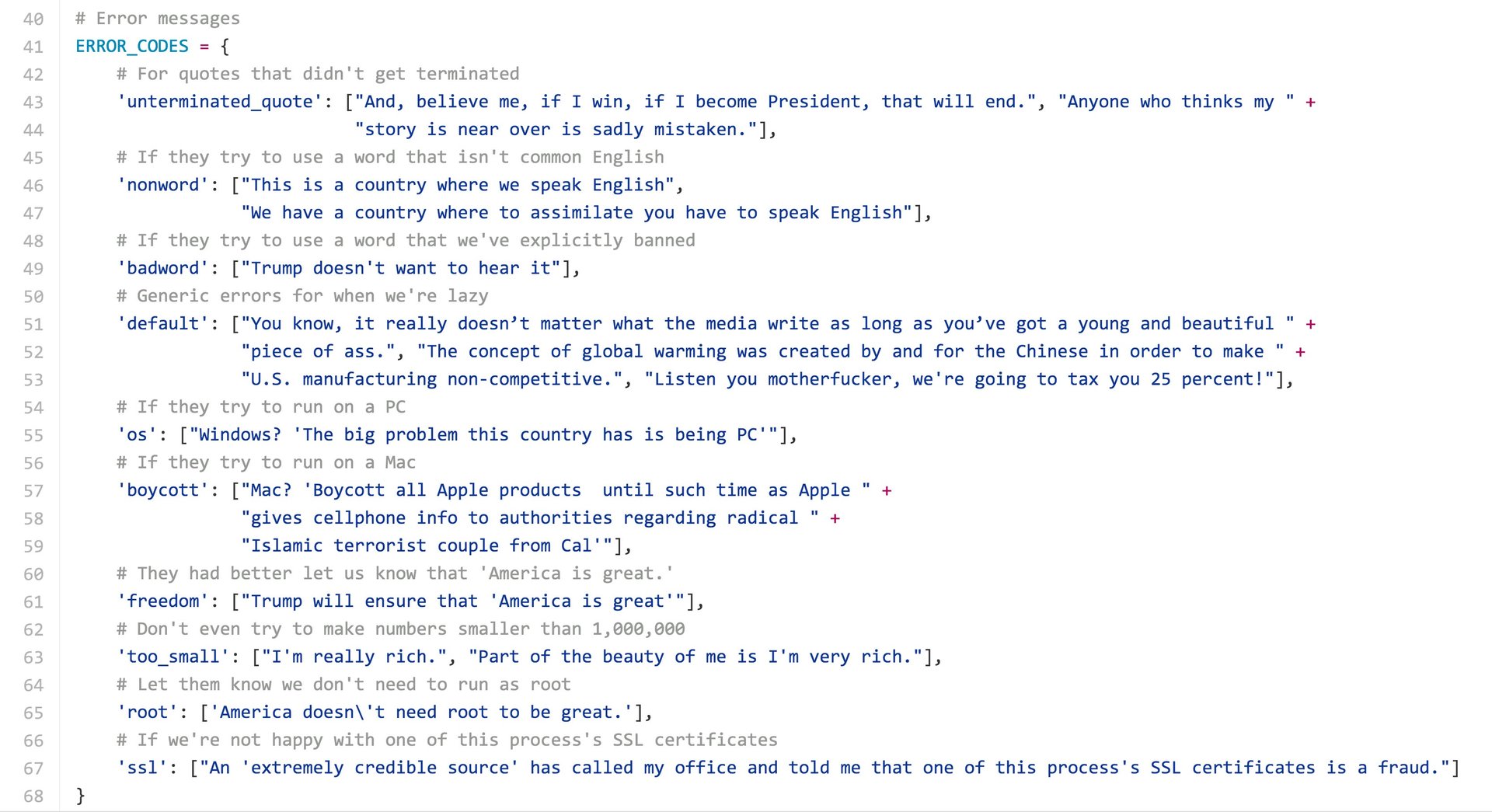When programmers get weird: The funniest code projects on GitHub
Of the 35 million open source projects on the code-sharing website GitHub, many are sophisticated software packages used by corporations all over the world. Others are smaller, single-purpose code libraries that many developers couldn’t live without. And some are just funny jokes.


Of the 35 million open source projects on the code-sharing website GitHub, many are sophisticated software packages used by corporations all over the world. Others are smaller, single-purpose code libraries that many developers couldn’t live without. And some are just funny jokes.
Code jokes may sound like nerd humor too esoteric for non-programmers to understand. And some do require a bit of explanation, but that’s what we’re here for. Here are our picks for the funniest projects currently on GitHub.
TrumpScript: “A language based upon the illustrious Donald Trump”

TrumpScript is a pseudo programming language that was created by four Rice University students at a 36-hour hackathon. According to the project’s description, the creators “found that the current field of programming languages does not include any that Trump’s glorious golden combover would approve of.”
Comprising about 1,000 lines of code, TrumpScript does seem to function as a full-fledged (though limited) programming language. Here are some of its features:
- TrumpScript will only let programmers work with numbers that are greater than one million, because “the small stuff is inconsequential.” Numbers under a million will produce a quote from Donald Trump himself as an error message: ”I’m really rich, Part of the beauty of me is I’m very rich.”
- TrumpScript does not allow the use of fractions or decimals–only whole integers, because “America never does anything halfway.”
- If a user tries to run TrumpScript on a Microsoft Windows computer, it’ll produce this error message: ”Windows? ‘The big problem this country has is being PC.'”
- “All programs must end with ‘America is great.'”
As fun as that sounds, TrumpScript would be exceedingly difficult to use, as it often does not produce error messages when the code fails. According to its creators, that’s because ”Trump doesn’t like to talk about his failures.”
is-thirteen: A software package that checks whether a number is equal to 13
In just about any programming language, checking whether a variable is equal to the number 13 would look something like this:
if (someNumber == 13) // true else //false

Simple, right? Well, that’s the joke. is-thirteen is a project comprising hundreds of lines of code, 92 contributors, and a code of conduct policy, all for a software package that checks whether a number is equal to 13.
The project was apparently created to poke fun at real software packages that provide the same kind of unnecessary functionality. One real-life project, for example, checks whether a number is greater than zero. Tiny, single-function software packages like these drew criticism last March when one was deleted–an action that disrupted web development all over the world.
The best part of the is-thirteen project is the section of its GitHub repository where people can post questions, comments, and feature requests. Here are just a few:
- Add support for XIII
- Add support for the movie “Thirteen”
- Add support for Olivia Wilde
- Remove support for Friday the 13th
- Create a Technical Steering Committee
- Add deep learning
- Does it scale?
If you ever find yourself in need of a software package like is-thirteen, just be sure to heed the warning on the project’s README page: “PLEAS READ THE SOURCE CODE BECAuse we moved fast and broke things.”
ComcastifyJS (by The Onion)

This project exists because, according to its description, “Sometimes images just load too damned fast.”
As it turns out, The Onion’s unique brand of satire is not limited to its fake news stories. Among the many perfectly real and practical repositories The Onion’s developers have uploaded to GitHub, there are a few hilarious outliers. ComcastifyJS, for example, is a JavaScript library that makes images on a web page load very slowly.
“With all this internet going around, sometimes you just want to experience the thrill of a long page load,” says the project’s README file. “Give your users the chance to enjoy a little slice of the future by slow loading your website’s images with ComcastifyJS!”
The developers even created a demo page, to show an image loading very slowly. One commenter suggested adding “a paid teared system where premium members can decrease speeds EVEN MORE than free users!!!” Another turned the project into a Chrome extension.
Apparently, the library was originally written for a story on ClickHole, titled, “These Koalas Are Refusing To Load In Support Of Net Neutrality.” Other projects developers from The Onion have uploaded to GitHub include fartscroll.js, which is a plugin that makes fart sounds as you scroll down a web page, and Betty Cropper, which is a real image cropping tool with a funny name.
Alternatives to lorem ipsum
When creating webpages, designers and developers often use placeholder text called “lorem ipsum” to preview what text will look like in certain page areas. It’s a nice-looking, Latin alternative to typing “text here text here text here.” There are lots of websites developers can use to generate and copy some amount of lorem ipsum. Here’s what it looks like:
Lorem ipsum dolor sit amet, consectetur adipiscing elit. Quisque consequat eleifend justo vitae facilisis. Praesent ut felis in velit feugiat accumsan.
But for many developers, simple Latin text was just not enough. In the awesome-ipsum repository on GitHub, there is a list of dozens of alternatives for generating placeholder text. Here are some of our favorites, along with examples of the text they generate:
Pasta Ipsum: “Features many varieties of pasta. Includes option to add random profanity for no reason.”
Pasta ipsum dolor sit amet farfalloni marziani mafalde shit ricciutelle pappardelle rat fart lasagne spaghettini orzo. Lasagne lasagnette conchiglie frakking sumbitch cellentani fagioloni maltagliati conchiglie farfalloni. Creste di galli strozzapreti penne zita asshole mafaldine pastina asshole foglie d’ulivo.
Hipster Ipsum: ”Artisanal filler text for your site or project.”
Brooklyn photo booth blue bottle tumblr, franzen 8-bit crucifix meh godard four dollar toast neutra cray asymmetrical. Pug DIY brunch trust fund XOXO, lo-fi sartorial kickstarter heirloom kitsch plaid bespoke pork belly tacos viral.
Corporate Ipsum: ”Designed to facilitate the needs of corporate paper-pushers everywhere.”
Leverage agile frameworks to provide a robust synopsis for high level overviews. Iterative approaches to corporate strategy foster collaborative thinking to further the overall value proposition.
Justin Bieber Ipsum: “Baby, baby, baby, how many paragraphs?”
It’s a Bieber world live it or die I make good grilled cheese and I like girls don’t be so cold, we could be fire. And all the haters I swear they look so small from up here swag swag swag, on you, chillin by the fire.
Mock JavaScript libraries

In the world of programming, developers are always trying to make things easier. They often do this by writing libraries, which are extensions of programming languages that handle simple, common tasks. Libraries give programmers an easy way to do these common tasks without writing the code themselves. When libraries become ubiquitous, as many have in JavaScript, it makes it easier for newcomers to use the language, but they might not actually know what they are doing. As a result, they often end up using libraries for performing operations that JavaScript could handle on its own.
In response, some developers created mock libraries, which served as both funny jokes and meaningful commentary on the scourge of real libraries:
- vapor.js is a JavaScript library that contains zero lines of code. On its project page, it’s billed as “The World’s Smallest & Fastest JavaScript Library.”
- semicolon.js is “a more secure and reliable vapor.js.” Rather than containing zero lines of code, semicolon.js contains a semicolon.
- Similarly, vanilla.js is a JavaScript compiler that compiles JavaScript into JavaScript. That is, it does nothing. But its GitHub page was convincing enough to confuse this innocent programmer.